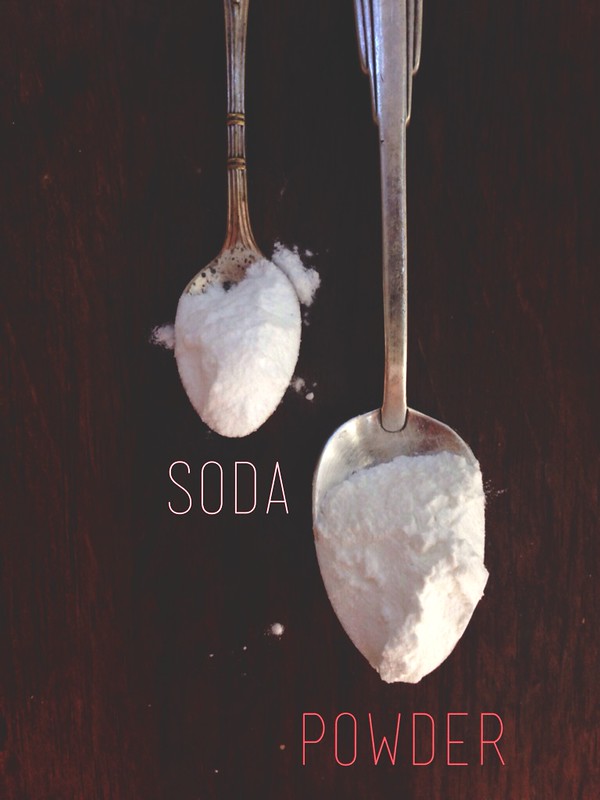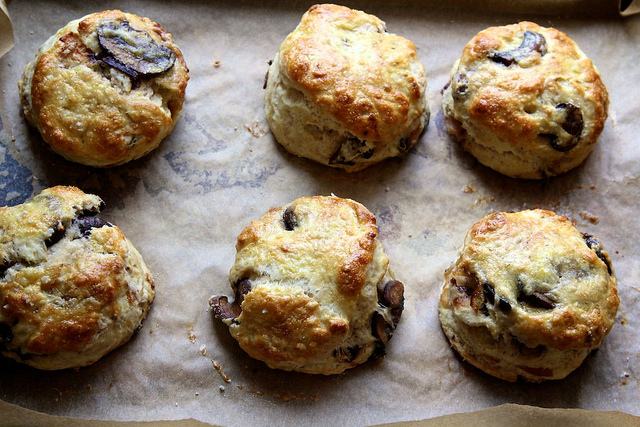I tell you this with nothing but love and understanding. I tell you this as a person who received the most mediocre grades in middle school science. I tell you this as someone who copied her chemistry homework from the nicest chemistry-smart boy she could find in high school. Don’t judge. It’s just the truth.
Baking is a science. It’s important to understand the reactions.
We need to talk about baking powder and baking soda… and you can totally copy my homework if you need to. It’s cool.
The difference between baking soda and baking powder:
Baking soda and baking powder are both odorless white powders that work their magic in our cakes. Though they’re both white powders, the two are certainly not interchangeable. Let’s talk about the facts behind these baking essentials.
Baking soda is also known as sodium bicarbonate. I told you we were talking science. Stay with me.
When sodium bicarbonate meets with heat, carbon dioxide gas is formed. It’s this gas that gives rise to our favorite cakes, cookies and biscuits. There is one drawback to the production of this gas. When heated, sodium bicarbonate also produces sodium carbonate, which doesn’t taste very good. If you’ve ever eaten any metallic tasting cakes or biscuits, you know what I’m talking about.
Thankfully, the metallic taste of sodium carbonate can be neutralized by acid. Lemon, yogurt, buttermilk, and unsweetened natural cocoa powder can neutralize the taste of sodium carbonate and keep our baked goods risen and lifted.
Baking powder is a mixture of baking soda and acid. Yea! Baking powder is part baking soda! Baking powder is made up of baking soda, a powdered acid, and cornstarch.
Most baking powders are labeled ‘double-acting’ meaning they release a small amount of carbon dioxide gas when they’re stirred into the batter or dough, but they release a majority of their precious gas when triggered by the heat of the oven.
Because baking powder is a leavener that contains both the sodium bicarbonate and the flavor-saving acid, it is usually paired with non-acid ingredients like whole milk and Dutch-processed cocoa.
Baking soda need an acid. Baking powder has an acid. We made that science easy, right?


162 Responses
Why do some recipes call for both baking soda and baking powder?
Your article does not tell me when to use Baking Soda versus Baking Powder or if can substitute Powder for the soda (since it has properties of both). Science is useless without application….
useless!
Thanks alot for d info… I think changing my recipe to baking soda will b great.
This was a clear and easy to understand explanation. and your style was most entertaining too. I’ll sign up! Thanks!
Thanks..Joy….I have been experimenting with gluten free waffles, and doing well with 1 Tblsp. BAKING POWDER but now I would like to use some buttermilk..shold I add some soda also, if so, how much?
O
What recipe are you talking about?
Sodium bicarbonate (baking soda) will not produce carbon dioxide UNLESS there is also acid. It is commonly used when other ingredients are already acidic, as in buttermilk pancakes or dishes that contain fruit. The reason you use half as much baking soda as you use baking powder is because baking powder contains equal amounts of baking soda and cream of tartar (which is an acid) that activates the baking soda. Heat alone will not activate baking soda.
Which baking powder is the best for baking cake. When i bake a cake it doesn’t look like a real wedding cake , it doesn’t scatter . What makes it so? Tnx
Thank you for this!!! I can also see the difference with taste too!!
Thank you for this. Although I am a baker, I required this information for my school project. I loved that you kept it simple. Happy Baking!
Overall, this blog post successfully clarifies the differences between baking soda and baking powder, offering readers a solid foundation for successful baking adventures. Well done!
Joy We are using your information on baking soda vs. baking powder as a scientific reference for science fair. We are also baking your Caramelized Onion and Mushroom Biscuits as the science experiment leaving out the baking powder and adding in more acid and baking soda to see what will happen. Thank you for all of the information you’ve given. It’s been helpful!